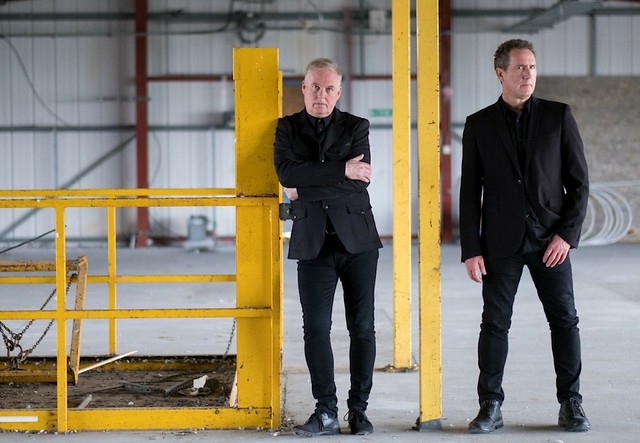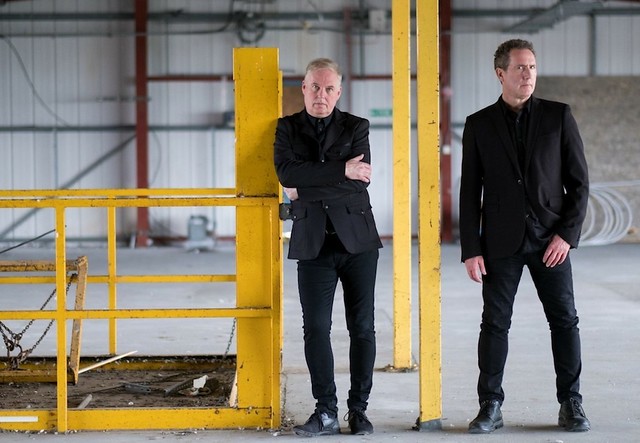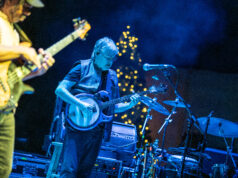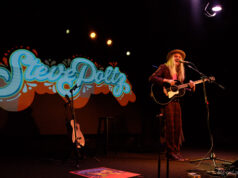
Paul Humphreys and Andy McCluskey (right) of Orchestral Manoeuvres in the Dark (Photo courtesy Ticketfly)
The brilliant Orchestral Manoeuvres in the Dark (OMD) released The Punishment of Luxury, their 13th studio album, on Sept. 1 via 100% Records subsidiary White Noise. The album fared very well commercially, hitting #4 on the UK Albums chart as well as #7 on the US Top Dance/Electronic Albums chart.
I had the genuine pleasure of again chatting with Andy McCluskey, vocalist, bassist, keyboardist, and songwriter for OMD, as the band will launch a North American Tour with a performance at 9:30 Club on March 6, 2018. (It’s not officially announced by 9:30 Club yet, but buy your tickets online here.)
In our chat, Andy provides insights into songs on The Punishment of Luxury, shares his feelings on recent work by Gary Numan and New Order, and reveals artists (with some surprises) with whom OMD would like to collaborate (particularly as they approach their 40th anniversary as a band).
I babbled a bit more than usual because he’s a personal hero, and as such my interview covered a lot of ground. I’ve edited the order of the questions to improve their logical flow and trimmed them where necessary for brevity. (Also, perhaps read our previous Parklife DC interview with Andy McCluskey from May 2016.)
***
Mickey McCarter: I want to congratulate you! I’m not the first, and I won’t be the last, but you have a wonderful new album.
Andy McCluskey: Thank you!
MM: You’ve talked a few times about how various songs on the album were inspired by various pieces of art (such as with a discussion in the DVD commentary that came with the PledgeMusic crowdfunding special edition of the album). And it struck me that the album itself as a work of art is very similar to some of the paintings you enjoy in that you can spend some time with it, it’s thought-provoking, it’s multi-dimensional. You can go away from it and come back to it fresh and enjoy a perspective on the textures, and the lyrics, and the meaning — and absorb it. And I think that’s a fascinating thing for something that hit the UK top 10 like it did.
AM: Well, thank you very much for your feelings and response! You can interview me all day.
The whole point is that we make music because we have thoughts, we have feelings, we have things we wish to convey — things to explore. We are interested. We get inspired by things around us but also by art.
So it’s delightful to you hear that you can approach it from different angles and on different levels, so thank you.
MM: You have I presume been pleased with its reception.
AM: Yes, I have — for the most part. There have been a couple of lazy journalists who hear my singing and the synth melodies and go, oh, yeah, it’s OMD, doing the same thing over and over again. *yawn* *yawn* — and you’re just like, “Really? Did you not understand?”
We *do* the same thing over and over again in that, yeah, we are still thinking, we are still experimenting, we are still asking ourselves questions. For the sounds we are using, we tend to do different things as well. So there’s been a couple of lazy reviews but for the most part, it’s been generally positive.
Y’know, when you really put a lot of effort into something, which we do, it’s great when people recognize it by saying, I can feel and hear all of the things they are trying to do on this record instead of just turning out some sort of lazy pastiche.
Watch the animated official music video for “The Punishment of Luxury” by OMD on YouTube:
[youtube https://www.youtube.com/watch?v=2cU53wWb6UI]
MM: Let’s discuss the themes of the album for a few moments. It’s a word of caution? The Punishment of Luxury? Don’t lose yourself? If there is a message, could you sum it up easily? Or is it more of a journey and not a destination?
AM: I don’t think the album as a whole has one overriding message that I can condense into one sentence. There’s a variety.
We’ve always said, oh, we try not to write love songs with cliché lyrics, but love is the most powerful human emotion. And actually writing songs about how you feel when you are in the lap of love is entirely a reasonable thing to do. Music should be about the human condition. But we try to avoid if we can as many of the lyrical clichés that there certainly are in the world.
So there are songs about love and pain and happiness and sadness. Yes, there are some cautionary tales about the modern world, particularly as “The Punishment of Luxury” is concerned. We are not *against* owning things. We are not against nice things. But what we are saying is unfortunately now most people in the Western developed world have sufficiency. But we have been brainwashed by invidious marketing men who know how to get inside our heads and make us feel unworthy. And they manage to convince us that we must buy their products and replace our old products otherwise we are not worthy of love and self-respect.
That is quite frightening. People have got enough but they are more unhappy than they ever were.
MM: Do you have a personal favorite song on the album? It seems from your commentary that “Robot Man” perhaps is the most personal song on the album to you, but is that the one you would ask people to listen to?
AM: “Robot Man” resonates particularly strongly with me. Strangely enough, it’s one of the tracks on the album that seems to divide people. There are quite a few people who don’t get their head around that song, which is interesting.
It resonates strongly with me because it was consciously written to be incredibly minimal. I was consciously trying to write a really stripped down, angular, and quite brutal piece of thumping electro — and then deliver with it a song about me wishing to no longer be the robot man. If ever there were a song written about a man who had therapy, that’s the one. It’s about taking off one’s emotional armor and daring to be vulnerable. If you believe in yourself with sufficient self-love, you can actually say, I don’t need to pretend to be hard anymore. And so you can reach in and touch me, and I can reach out and touch you. It’s a song about taking off my armor and not being the “Robot Man.”
MM: OMD always have written about love. But as a fiftysomething-year-old man versus being a twentysomething-year-old man, and how you feel about it in your middle years versus your early years, can be quite an interesting topic to explore.
AM: You know what? Just because you get older doesn’t mean you cannot feel love — that you cannot feel the pain of love ending or being taken away. It’s a visceral powerful emotion, as I said earlier. I’ve had my emotional ups and downs, and I feel that it’s entirely relevant to express that. I’ve always sung in what I think is a fairly emotional way, and we often used the machinery as a complementary foil in contrast to being human because it’s so rigid. I sound even more emotional singing across rigid machine patterns.

 Paul Humphreys and Andy McCluskey pose in San Francisco for photos taken by Chester Simpson for NME in 1981. (Photos by Chester Simpson)
Paul Humphreys and Andy McCluskey pose in San Francisco for photos taken by Chester Simpson for NME in 1981. (Photos by Chester Simpson)
MM: I like that the “Robot Man” track also is partly inspired by Daniel Miller [head honcho of Mute Records] and his music. And I’m interested in how you relate to your peers — the folks like Daniel Miller who started out at the same time doing a similar sort of thing. It strikes me that peer set is doing very well as you measure these things. New Order have a very heralded recent album. Like you, Gary Numan broke the UK top 10 with his new album.
Any thoughts on those peers and those musicians that you’ve grown up with? Is there anything in there lately you’ve particularly enjoyed hearing or seeing? And I ask in part because I know you get asked all of the time “what new acts are you listening to,” and I myself have asked you that in the past.
AM: I was really excited for Gary and that people really wanted to hear his music — so much so that I sent him a text to congratulate him on his success. He’s had a long time where there was a lot of critical negativity toward him, and he spent a long time reinventing and repositioning himself. And I think some of his new sounds and his new approach are really energized. The sounds he is generating on his new record is super modern and really powerful stuff. He’s still expressing a very dark, melancholy, existential lyric, which probably hasn’t changed. It’s not dissimilar to the ideals of Ian Curtis from Joy Division. I don’t think Barney from New Order has really explored the depths of darkness and depression like Gary and Ian and like I sometimes do.
It’s great when people still feel like they have something to say, and when they say it strongly with passion and energy and good thinking, they are still able, even when they are older, to see people recognize it and respond to it.
We are never going to sell the number of records that modern pop artists do, whether it’s Adele or Ed Sheeran or Rihanna or Beyoncé. It’s not going to happen anymore. But it’s great when people do get rewarded for still trying hard to make special music.
MM: I’m inspired to ask if you and Paul throughout the years have kept tabs on anybody. Do you ever call up Gary or anyone to touch base or hang out? Do you guys have professional colleagues or friends you see at festivals or the like?
AM: There’s no one in my phone who is in a famous band that I would call a close friend or who I would go to dinner with, although I am sure I would enjoy that relationship with some.
However, it’s great if I bump into Gary Numan or if I bump into the guys from New Order or Martin Fry. We always seem to play a festival somewhere with ABC every year, and we always enjoy a really great conversation with Martin Fry. He’s friendly and warm and intelligent. You can never not have a great conversation with him. He’s lovely.
Gary played in Liverpool not so very long ago, and fortunately I have his email address and I contacted him. He invited me down. I hadn’t seen him in over 20 years! It was so great to see him again. He was so kind to us in 1979 when he took us on the road when he was huge and we were two kids with a tape machine. He even carried us in his bus and took our gear in his truck. He’s a really good guy, and I’m so delighted for him to be doing well.
I would like to see him again but I am on tour myself!
MM: [Speaking of years past,] the process of writing The Punishment of Luxury doesn’t sound like too different a process than OMD employed in the past. And I wanted to compare it a little bit to what I know about how you guys created Architecture and Morality. It’s still a very popular album today. I read about how you came up with the sonic textures and lyrical inspirations while on tour. And the results in both cases deal in big abstract ideas.
Lots of people love that album, and a similar process there resulted in a different thing with The Punishment of Luxury, which is great in different ways.
AM: The songwriting is by Andrew McCluskey and Paul Humphreys. We’ve been on a long journey together in Orchestral Manoeuvres in the Dark; we are still the same people.
We have now a consciously raison d’etre as we did in the very early stages of the band — which is to question and explore and experiment but also to have something interesting lyrically. We don’t sit around asking ourselves what are we going to write? We think something, and then we go, oh, I might write about that!
I’ve recently participated in a lot of interviews where I’ve mentioned the post-modern era of popular culture. And I asked myself, how can I express that? And I came up with the idea of “Art Eats Art” because pop culture is now self-referential. It is consuming its own history. So “Art Eats Art” is an appropriate way of titling it, so I went off on a journey to see if I could find a musical way of expressing that. In the end, I copped out because I just made a list of artists — classical composures and architects! I couldn’t find another way of doing it. (Chuckles.)
The principle that is very similar: Can we do something that we haven’t done before musically that interest us, that stimulates us, and that excites us? Once we are musically excited, the creative juices really flow. Can we put into music some of our more abstract or existentialist ideas that you can’t find a way of expressing easily verbally?
It’s the same ethos, and it’s a different ethos to some degree. In the second half of the 1980s, we were under so much pressure that we had to rely upon being musical craftsmen. We didn’t have the to explore the theoretical or experimental elements.

Paul Humphreys and Andy McCluskey (Photo courtesy Tell All Your Friends)
MM: You’ve talked about the commercial pressures of the ’80s and ’90s a bit in other interviews. But I have to say as an OMD fan, some of that late ’80s stuff is brilliant. [I don’t say this, but who doesn’t love “Forever Live and Die” and “Shame” from the Pacific Age, for example?]
AM: We are comfortable that there is good stuff there, but we feel that some of the albums could have been even stronger had we had the time to write other songs. We then might have pulled some that went on the albums, and they might have been B-sides and things.
I’m not saying there isn’t good stuff on those records. But in their entirety, the expressed one or two elements that we felt we could have improved upon.
MM: The 40th anniversary of OMD is coming up, and you’ve hinted that you may embark on a 40th anniversary project after you are finished touring The Punishment of Luxury. In an interview, you mentioned that such a project might involve some collaborations. So two questions — 1) Do you have any thoughts as to what your 40th anniversary celebration might look like? 2) If you do go down that path of collaborating with folks, is there anybody you would like to collaborate with?
AM: We do have plans. Nothing is definite or public yet, so I cannot tell you, unfortunately. But, yes, we’ve got some things up our sleeves that we are going to do to celebrate.
In terms of collaborating, we do have increasingly a mind to try some collaborative work. There are a few select people. I’ll tell you, and I’ll probably be embarrassed when it turns out that they all say, “No, thank you.”
I would love to do something with Gary Numan. I would love to have Billy Gibbons play on one of our records. Some people find that a bit strange, but I would! [In the past, Billy Gibbons of ZZ Top has commented that seeing OMD on The Old Grey Whistle Test, where ZZ Top also appeared, inspired his band to incorporate synthesizers into their work.]
I would love to have Robyn do something with us. I quite like the idea of doing something with Hot Chip; I don’t know how we would do it.
And here’s a crazy one for you. This might sound a bit conceited, but I would like to write a song for Adele — to sing in what I feel would be a truly, genuinely, heartbreaking way with music that is a little bit more challenging to act as a foil so that she could really bleed onto a record. I think she could do even more than she does. For my taste, I find the music accompanying her to be a little too plain. I think we could come up with something that would allow her to sing across something more angular that would really make her sound like she was bleeding emotion. There’s a crazy idea for you.
MM: I love it! That’s a great idea.
Well, I’m going to close it up, but let me say you are going to kick off your North American tour here in Washington, DC, and we’re so excited.
AM: Thank you. We are looking forward to coming back. The 9:30 Club has a different resonance for me than it did previously — we played there twice before — because I reviewed the Singles album by Future Islands a few years ago. And they were so pleased with my review that they got in touch with me through their manager. When they came to play in Liverpool, I met them and they said, you don’t know what it’s like to finally get to meet you and you’ve come to see our gig because we’ve loved you for years and we saw you at those gigs at the 9:30 Club! I was playing to Future Islands and I didn’t even know. [Read Andy’s review of Future Islands for Talkhouse.]
Watch the official music video for “So in Love” by OMD on YouTube:
[youtube https://www.youtube.com/watch?v=mD8TApX3btM]
MM: Any closing thoughts?
AM: We’ve worked really hard on an album that we feel is really strong. We got some amazing artwork. We are looking to sell out the biggest UK/Irish tour we’ve done in 30 years.
We’re coming back to American to do our third headlining tour since we reformed [in 2006], and it’s going to be the first one where we don’t lose money. That’s saying something good, isn’t it? We’re going in the right direction! We chose to invest in America, and the last two times we’ve toured America headlining our own gigs, we have lost money. But we decided to invest in trying to rebuild our live work in America.
We feel like we are in a very nice place. We like being Orchestral Manoeuvres in the Dark. We like the balance we have now. We don’t do it 24 hours a day, every day. When we are busy, we are really bloody busy. But we take the time now to be with the people that we love and who love us.
If we needed a little life lesson, we got it four years ago when Malcolm Holmes had a cardiac arrest in Toronto on stage. And he lived. Then, we didn’t do anything for 12 months because we didn’t want to put any pressure on him whilst he recovered.
It made us realize it’s actually quite good to step back and get a work/life balance. Listen, we’re not complaining. We’re *blessed* that people still want to see us and hear our music. But even as a musician, I can say there’s more to life than music.
You know what the funny thing is? In the 12 months that we just stopped to be with the people we loved, that time allowed us, unknowingly, to fill up our well of inspiration and to discover all sorts of things that then resonated with us and came back into our music! It was a win-win.
We can’t wait to come to America to share the new stuff and the old stuff with everybody.
***
OMD are on tour in England right now. Catch them tonight, Nov. 6, at Royal Concert Hall in Nottingham, and then throughout the rest of the United Kingdom and Europe through February. In exactly four months from today, OMD will perform at 9:30 Club. Buy your tickets online.
Orchestral Manoeuvres in the Dark
9:30 Club
Tuesday, March 6
Doors @ 7pm
$40
All ages






